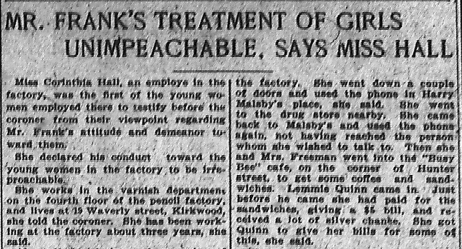Another in our series of new transcriptions of contemporary articles on the Leo Frank case.
Atlanta Journal
Thursday, May 8th, 1913
Miss Corinthia Hall, an employe in the factory, was the first of the young women employed there to testify before the coroner from their viewpoint regarding Mr. Frank’s attitude and demeanor toward them.
She declared his conduct toward the young women in the factory to be irreproachable.
She works in the varnish department on the fourth floor of the pencil factory, and lives at 19 Waverly street, Kirkwood, she told the coroner. She has been working at the factory about three years, she said.
About 11:45 o’clock on the morning of April 26, she said, she left the pencil factory. She had been there for about ten minutes with Mrs. Emma Freeman, a bride of a day, formerly employed there, to get Mrs. Freeman’s coat. She remembered looking at the clock as they went out. She and Mrs. Freeman spoke to Mr. Frank. He asked Mrs. Freeman, “How’s the bride?”
“How did he know she was a bride?” queried the coroner.
Miss Hall said Mrs. Freeman (who had been Miss Clark the day before) ran away from the factory to the minister’s to get married. Mr. Frank was in the door of his office, said she. She saw a stenographer and Mrs. White in the office. Frank asked her, the witness, to tell Arthur White that his wife wanted to see him downstairs. Arriving on the fourth floor, she saw Arthur White, Henry Denham and Mrs. Mae Barrett. The coroner asked her a number of questions as to what Mrs. Barrett had in her hands, if she saw any crocus sacks there. The witness said that she did not see any crocus sacks in Mrs. Barrett’s hands. Mrs. White did not come upstairs at the time. White went downstairs to her. The witness got Mrs. Freeman’s coat and went downstairs, and White introduced her to his wife.
MET QUINN IN CAFÉ.
The coroner asked the witness if she knows “Mr. Hays, who works in the office of A. P. Stewart, tax collector.” She knew Maybell Hays’ father, replied the witness. The coroner asked her if she told Mrs. Hays anything about Mrs. Barrett and some crocus sacks, and she replied that she did not. She detailed her movements after leaving the factory. She went down a couple of doors and used the phone in Harry Malsby’s place, she said. She went to the drug store nearby. She came back to Malsby’s and used the phone again, not having reached the person whom she wished to talk to. Then she and Mrs. Freeman went into the “Busy Bee” café, on the corner of Hunter street, to get some coffee and sandwiches. Lemmie Quinn came in. Just before he came she had paid for the sandwiches, giving a $5 bill, and received a lot of silver change. She got Quinn to give her bills for some of this, she said.
That was about 12:30 o’clock. She asked Quinn what he was going to do that afternoon. He said he was going to the Atlanta theater. His wife didn’t want to go, he said. She told the coroner the name of a young man, saying that it was to him that she telephoned. Asked about the employees on the fourth floor, she mentioned the name of Joe Sletzer, foreman in that department. Replying to a question from the coroner, she said she didn’t know of any trouble between White and Sletzer. She did not see Mary Phagan on Saturday. The last time she had seen Mary Phagan was on the preceding Monday, which was the last day that Mary worked there. She did not see Holloway, the day watchman in the factory, that Saturday, but did not him on the street nearby when she and Mrs. Freeman approached the place.
“Do you know whether Mr. Frank knew Mary Phagan?”
“No, I don’t think so. He doesn’t know many of us.”
“What is Mr. Frank’s conduct toward the girls working in the factory?”
CONDUCT IRREPROACHABLE.
The witness replied in effect that it is irreproachable, so far as she knows.
“You never saw him display any undue familiarity toward any of them, did you?”
“No, sir.”
“Did you ever see him chuck any of them under the chin, or try to kiss them?”
“No, sir!” answered the witness, with emphasis.
She was excused, and the inquest recessed immediately, at 12:55 o’clock for lunch.
* * *
Atlanta Journal, May 8th 1913, “Mr. Frank’s Conduct Toward Girls Unimpeachable, Says Miss Hall,” Leo Frank case newspaper article series (Original PDF)
